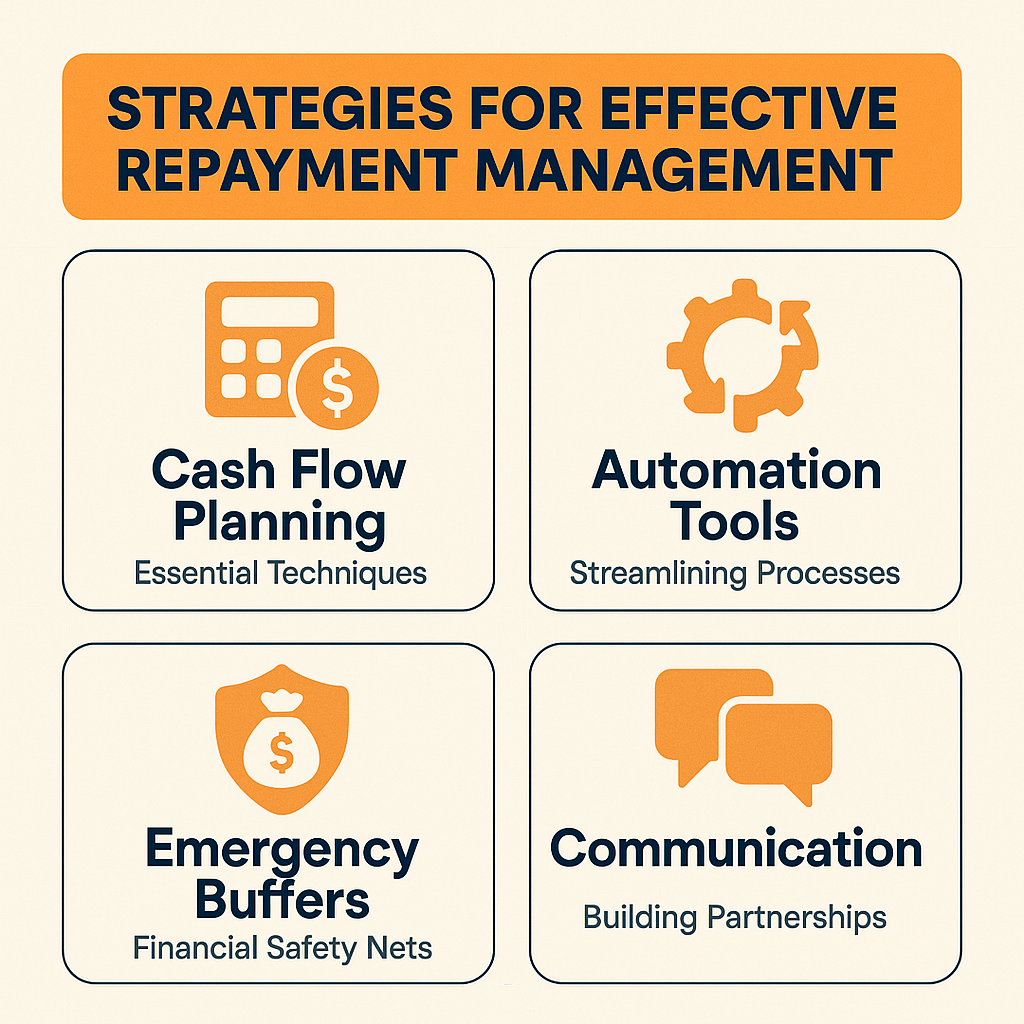Managing business financing repayments doesn't have to keep you awake at night. When you're dealing with merchant cash advances or other funding options, reducing stress during repayment cycles becomes essential for maintaining both your business health and personal well-being. The key lies in understanding that repayment stress typically stems from uncertainty, poor cash flow planning, and lack of clear communication with your funding provider.
Modern businesses have access to numerous tools and strategies that can transform the repayment experience from a source of anxiety into a manageable part of operations. By implementing smart planning techniques, leveraging technology, and maintaining open dialogue with funders, you can create a repayment structure that works with your business flow rather than against it.
Essential Cash Flow Planning Techniques
Cash flow planning forms the foundation of reducing stress during repayment cycles. When you can predict and manage your money movement, repayments become less intimidating and more predictable.
- Align repayment schedules with sales cycles: Understanding your business's natural revenue patterns allows you to structure repayments during stronger cash flow periods, reducing financial strain during slower months.
- Create detailed weekly cash flow projections: Short-term forecasting helps you anticipate potential shortfalls and adjust operations accordingly, giving you control over your financial situation.
- Track daily sales performance: Regular monitoring of revenue streams enables quick adjustments to repayment strategies and helps identify trends that might affect future payments.
- Separate repayment funds from operating capital: Designating specific accounts or reserves for repayments prevents accidental overspending and ensures funds are always available when needed.
Leveraging Automation Tools for Smoother Operations
Automation tools have revolutionized how businesses manage their repayment processes. These technologies can significantly reduce the administrative burden and human error that often contribute to repayment stress.
- Automated payment scheduling systems: These tools ensure timely payments without manual intervention, reducing the risk of missed deadlines and associated penalties that can escalate stress levels.
- AI-driven cash flow analysis: Advanced software can predict cash flow patterns and alert you to potential issues before they become problems, allowing proactive rather than reactive management.
- Integrated accounting platforms: Connecting your repayment tracking with your main accounting system provides real-time visibility into how payments affect your overall financial picture.
- Mobile monitoring applications: Access to repayment information and controls from anywhere helps you stay informed and make quick decisions when situations change unexpectedly.
Building Effective Emergency Buffers
Emergency buffers serve as your financial safety net, providing peace of mind and practical protection against unexpected challenges during repayment periods. Building these reserves strategically can eliminate much of the anxiety associated with financing obligations.
- Establish a repayment reserve fund: Setting aside a percentage of daily sales specifically for repayment emergencies creates a cushion that can handle temporary revenue dips without disrupting your payment schedule.
- Diversify revenue streams: Multiple income sources provide stability during seasonal fluctuations or market changes, ensuring consistent cash flow to meet repayment obligations.
- Negotiate flexible repayment terms: Working with funders who understand business cycles and offer seasonal adjustments or temporary relief options can prevent minor setbacks from becoming major problems.
- Maintain supplier payment flexibility: Building good relationships with vendors who can accommodate temporary payment delays during tight periods preserves cash for critical financing obligations.
Mastering Communication with Funding Providers
Clear communication with your funding provider can transform a potentially stressful relationship into a collaborative partnership. Transparency and proactive dialogue often lead to more favorable outcomes when challenges arise.
- Establish regular check-in schedules: Periodic communication with your funder helps build trust and ensures they understand your business's performance patterns, making them more likely to work with you during difficult periods.
- Provide transparent financial reporting: Sharing accurate business performance data demonstrates responsibility and helps funders understand your repayment capacity, potentially leading to more flexible arrangements.
- Communicate challenges early: Alerting funders to potential issues before they affect payments shows professionalism and often results in collaborative solutions rather than punitive measures.
- Document all agreements in writing: Clear written records of any modifications or special arrangements prevent misunderstandings and provide reference points for future discussions.
Strategic Approaches to Repayment Management

Developing a comprehensive strategy for managing repayments involves understanding your specific business model and adapting repayment approaches to work with your operational realities. This strategic planning can significantly reduce stress while improving your overall financial management.
- Time repayments with seasonal business patterns: Aligning higher repayment amounts with peak seasons and negotiating reduced payments during slower periods helps maintain consistent cash flow throughout the year.
- Integrate repayment planning with business growth strategies: Viewing repayments as part of your growth investment rather than a burden helps maintain a positive perspective while ensuring adequate planning for both obligations.
- Develop contingency plans for various scenarios: Having predetermined responses to different business situations (slow sales, unexpected expenses, equipment failures) reduces decision-making stress when problems actually occur.
- Monitor industry trends that affect repayment: Staying informed about regulatory changes and industry developments helps you anticipate and prepare for potential impacts on your repayment structure.
Reducing stress during repayment cycles isn't just about managing money; it's about creating systems and relationships that support your business's long-term success. By implementing thoughtful cash flow planning, embracing helpful technology, building financial buffers, and maintaining open communication with funders, you can transform what might seem like a stressful obligation into a manageable part of your business operations.
The strategies outlined here work best when applied together as part of a comprehensive approach to financial management. Start with the areas that feel most challenging for your business, then gradually implement additional techniques as you become more comfortable with each element. Remember that every business is unique, and what works perfectly for one company might need adjustment for another.
Success in managing repayment stress comes from preparation, communication, and the willingness to use available tools and resources. With these foundations in place, you can focus more energy on growing your business and less on worrying about financing obligations.

.png)






